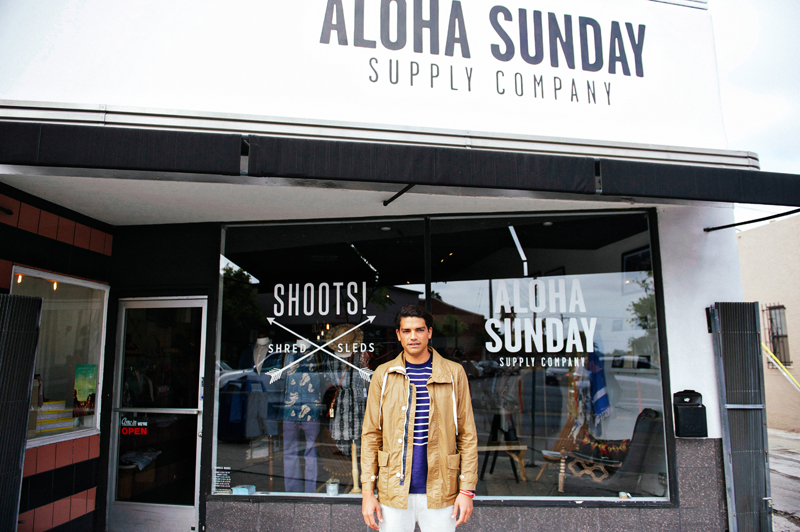Images by John Hook
This store brings Hawaii’s aloha all the way to San Diego.
Waiting in a whiskey bar in North Park, San Diego, a mustached bartender in a bow tie and suspenders slides over my drink. On the walls glow bottles of aged bourbons and expensive scotch and the stereo blares a not-so-popular-but-totally-awesome Beatles song. I’m on-ly slee-eeeping…
It’s the kind of bar where you know the whiskey sour will be the real kind (with egg whites) without having to ask. The shuka-shuka, shuka-shuka shake of mixed drinks sounds like maracas, pervading seven separate conversations. The bar is a song.
And then a man walks in and the seas part. The shuka-shuka ceases, and everyone watches as the specimen moves through the room. A woman glances at the man while talking to her date, coughs, and her Old Fashioned spurts from her nose.
The man is distractingly handsome. Six-feet-two-inches, chiseled, effortlessly dressed. A Polynesian avatar. This man is Kahana Kalama. He sits down beside me. I should’ve worn a different shirt.
Kalama, born and raised in Kailua, owns a shop called Aloha Sunday a couple blocks down the street from this bar. It’s been there for three years now. His shop fits well in the hip and walkable urban community of North Park the same way this craft-cocktail whiskey bar does. Which is to say that his shop, this bar, and other outfits and restaurants share an ethos with the town. What’s that mean?
“The ethos?” says Kalama. “Well, I just really like personal, thoughtful people, the conscientious customer. The customer that really digs into a product and doesn’t want to buy something just because everyone has it, but more because it has a story, and they vibe with that story behind the product.”
A burly man with long, wild hair recognizes Kalama, cuts in, and asks about his store and family. The guy looks like he’s in either a biker gang or a metal band—or both—but nonetheless is crippled by Kalama’s smile.
Kalama’s product is not only a store but a brand as well. Primarily a men’s clothing line, from blazers to denim to aloha shirts and more, Aloha Sunday is also kind-of-sort-of a surf shop. “For the surfer that’s growing up or finding himself in professional positions,” he says. Kalama was also a professional surfer once, touring the world after graduating from Point Loma in San Diego, so he kind-of-sort-of knows his shit.

But Aloha Sunday isn’t your run-of-the-mill, Quik-through-Volcom surf shop. “We’ve got some surf necessities—boards and wetsuits—but we’re more of a men’s store. Basically anything you’d use in everyday life.”
“Anything” includes, but is not limited to: facial scrubs, face masks, moisturizers, coffee, soaps, candles, toothpaste, throw pillows, aftershave, more candles, cufflinks, sling shots, space pens, and tree swings. All are premium products, with some imported from Italy and Japan, and all cut-and-sewn made in America.
The clothing: classy, well-fitting stuff (for a surfer), but affordable, comparatively. “I wanted to manufacture products in a way that I’m proud of,” he says. “Some people might say that it’s a trend, but there’s an authenticity in it and it’s that authenticity that spawns other trends.”
An eavesdropping bartender cuts in and asks Kalama if he knows so-and-so. Kalama’s presence is that magnetic. The personification of “comfortable in his own skin.” Every word is intentional, calculated, authentic. And, how did a local kid from Kailua get into this racket?
“I was kind of that kid that grew up surfing and skating, but didn’t really hang out with the skaters and surfers,” says Kalama, who hung out more with the graphic designers, the guys in ad firms, charities, and non-profits. He started working with the brands that he surfed for. He stayed in San Diego. “And then I moved up here to North Park and found a bunch of kids just like me.”
I ask Kalama how San Diego had helped to inspire his brand, presuming how fashion seems to catch on to Hawai‘i a little later than some places. He corrects me.
“Really, all my experiences come from Hawai‘i as a kid. I grew up on the Eastside and kids over there hated on Town for being so crowded. But me, I loved going over there and seeing how they dressed. The Japanese tourists and old Midwest couples with the matchy-matchy aloha prints, the international costumes—I got a kick out of it,” he says.
“Not to mention, when I was young, I was super small. And whenever there was a dress-up function, I had nothing to wear, so I’d have to wear my dad’s stuff, which of course was always so huge on me. All I ever wanted was some good fitting clothes.”

I ask if he was planning on living in North Park forever. If there was a chance for an Aloha Sunday, back home. He nods, absolutely. “I love change; it’s part of why I came here in the first place. And a lot of why I’m doing this up here is to inspire the little me’s back in Hawai‘i. Like, don’t feel bad for not being a moke! Don’t worry about that, just do what you’re good at, care what you’re passionate about, and there’s a lot that can come out of it.”
We finish our drinks and leave the bar. As we’re exiting, a woman walking in looks up at Kalama and trips on her own feet. And I’m thinking about a new tree swing purchase.

